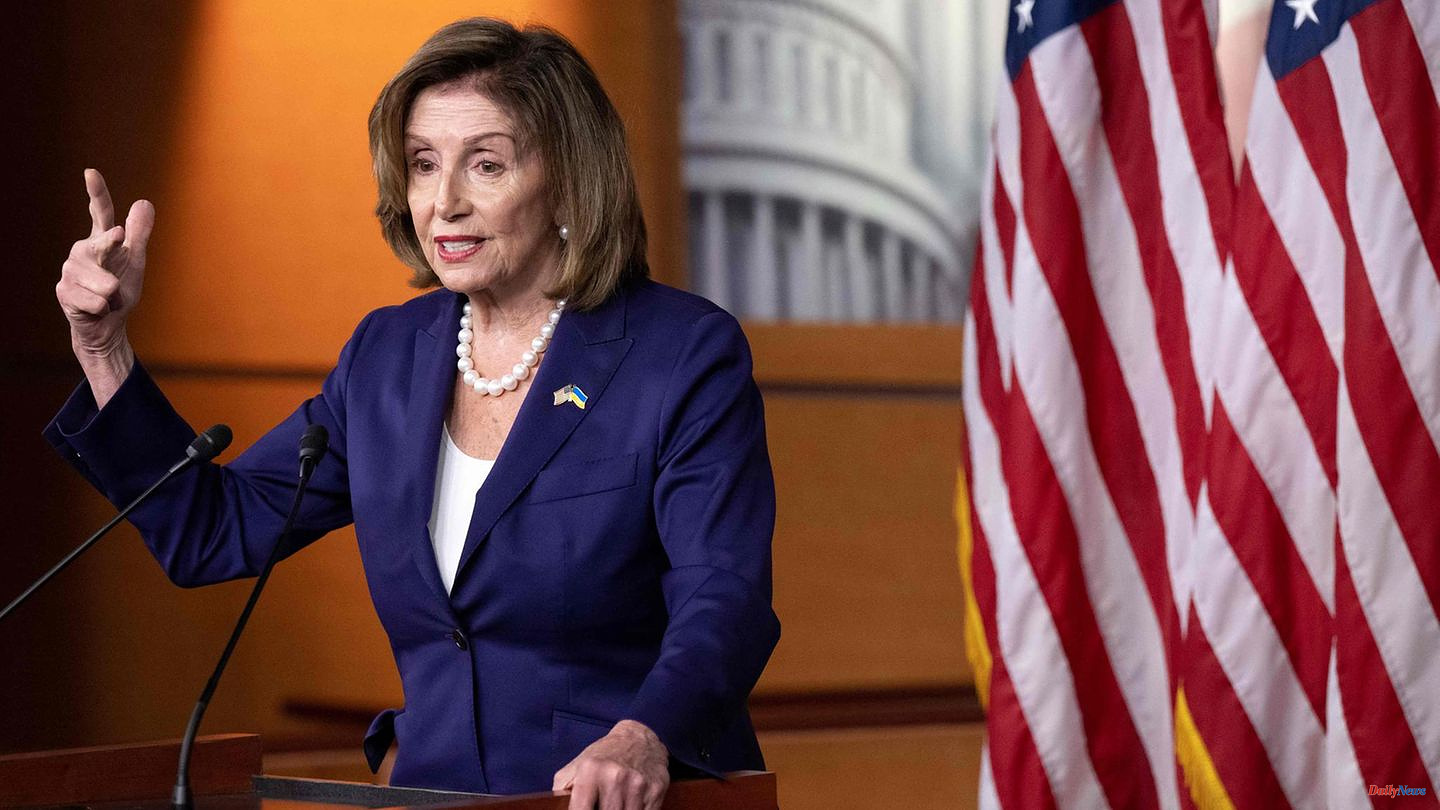What is left to hold onto? The US military doesn't think this is a good idea. The White House warns of an escalation. China is extremely out of tune and lets the sabers rattle. And German politicians also fear an escalation that could have "catastrophic consequences".
But one by one.
Nancy Pelosi, Speaker of the US House of Representatives, left with a delegation to the Indo-Pacific over the weekend to reaffirm "America's strong and unwavering commitment to our allies and friends in the region," according to an official announcement. The plans therefore include stops in Singapore, Malaysia, South Korea and Japan. However, one potential destination not on the list is causing concern: Taiwan.
The island republic with around 23 million inhabitants is located about 50 kilometers east of the Chinese coast, has been a point of tension between Washington and Beijing for decades - and is the scene of a diplomatic dispute that could now get out of hand.
As early as April, China announced "strong measures" should Pelosi visit the island republic. Then as now, their alleged visit was neither officially confirmed by the USA nor by Taiwan, but was made public through media reports. At the time, Pelosi had to postpone her trip to Asia due to an infection with the corona virus. Since then, concerns about an escalation, not least in the White House, have grown.
Asked about reports about Pelosi's presumed travel plans, according to which she could travel to Taiwan in August, US President Biden quoted the assessment of his military a few weeks ago, which currently considers the visit to be "not a good idea". Work is being done behind the scenes to dissuade Pelosi from visiting Taiwan, the New York Times and CNN reported, citing informed circles. The risk of escalation is too great.
Nevertheless, the top politician is apparently sticking to her travel plans. According to information from the parliament in Taipei, Pelosi is expected in the island republic this Tuesday (read more here). A Taiwanese MP confirmed various press reports to the German Press Agency that they might arrive in Taipei from Malaysia in the evening (local time). There could be a meeting with President Tsai Ing-wen on Wednesday.
According to US media reports, however, the travel plan is in motion, while the Pentagon is monitoring all the steps taken by the Chinese side and is working "around the clock" to ensure Pelosi's security, as it was said.
The initial situation is tense: the communist leadership in Beijing regards free Taiwan as part of the People's Republic and wants to isolate it internationally. On the other hand, the island republic has long regarded itself as independent. The Russian invasion of Ukraine has fueled fears that China could take the island's democratic republic by force in a similar manner. China's head of state and party leader Xi Jinping sees it as his mission to implement "unification" - and threatens to use the military in the process.
The USA, in turn, has committed itself to Taiwan's defense capability, which has so far mainly meant arms deliveries. However, President Biden has gone further than his predecessors and has repeatedly called it a US "obligation" to defend Taiwan in the event of an attack by China.
And so the speculation about a possible trip to Taiwan by top politicians has recently increased tensions significantly. China's leadership generally perceives visits by foreign politicians to Taiwan as a provocation - Pelosi's, however, would be extremely well-known and of particular political importance: As Speaker of the House of Representatives, the 82-year-old ranks only behind the US President and his Vice President. It would be the highest-ranking visit from the United States in decades.
China is correspondingly clear. A whole series of parliamentary delegations, for example from the USA and the EU, recently traveled to Taiwan, but Beijing left it at verbal warnings. Now China's military was holding live ammunition maneuvers near the island republic, while the air force flew patrols near Taiwan - Washington is obviously supposed to understand both as a warning.
The situation is also getting worse verbally. In a phone call with US President Biden on Thursday, head of state and party leader Xi Jinping warned his counterpart: "Those who play with fire will perish." Foreign Ministry spokesman Zhao Lijian added on Monday: Pelosi's visit would be "crass interference in China's internal affairs", the People's Liberation Army would "not stand idly by", the Chinese side "will certainly take energetic and decisive measures to protect our sovereignty and territorial integrity. "
Military responses have been discussed in China's state media, ranging from China's air force escorting Pelosi's plane and maneuvers to even establishing a no-fly zone around Taiwan and missile tests. Relations between China and the United States "are almost on the razor's edge," wrote the party-affiliated newspaper "Global Times" on Twitter.
The White House has now warned Beijing of an escalation. "There is no reason for Beijing to turn a potential visit consistent with long-standing US policy into a crisis or conflict," National Security Council communications director John Kirby said at the White House on Monday. The US would not engage in "saber rattling," he said. "At the same time, we don't let ourselves be intimidated."
According to him, the visit changes "nothing" in the USA's China policy. The US does not maintain official diplomatic relations with Taiwan, but regards Beijing as China's legitimate representative. However, Kirby also left open whether the visit will take place. He stressed that it was up to Pelosi to confirm a possible visit.
This puts the US government in an awkward position. If Pelosi cancels the alleged visit to Taiwan, the cancellation could be understood as a cave-in to China's threats. If she goes on the visit, it is likely to dangerously increase tensions with Beijing – and last but not least, to dupe President Biden, who had warned against a visit.
Already, the potential visit has created a rift between Pelosi — a high-profile and vocal critic of China for decades — and the Biden administration, which fears an escalation with the superpower. Especially since more and more Democrats and Republicans are backing the top politician, showing a clear edge and starting the visit.
In the European Union, the situation is apparently being observed with concern, as "Politico" reports, Beijing's "words could quickly become deeds", as a diplomat was quoted as saying. In view of the new tensions between China and Taiwan, German foreign politicians have warned of an escalation in the conflict.
The pressure is currently growing because a change of strategy could be imminent at the party conference of the Chinese Communist Party in the fall, said Alexander Graf Lambsdorff, FDP parliamentary group leader, to the "Rheinische Post". "Should Chinese President Xi Jinping consider an attack on Taiwan, the US would have to decide whether to intervene or not. If there were an attack, it would have catastrophic consequences, including for our economy."
According to Lambsdorff, a third of the world's semiconductor production comes from Taiwan. "With us, almost all supply chains in industry would be affected, many technical products could no longer be manufactured. From washing machines to airplanes." He added: "It is in our best interest that there is no parallel conflict between Russia and Ukraine and between China and Taiwan."
Semiconductors can be found almost everywhere today, for example in smartphones, computers, cars or medical devices. A shortage had led to price increases and supply chain problems in many industries during the corona pandemic. Large manufacturing capacities are located in Taiwan in particular.
The CDU foreign politician Roderich Kiesewetter also expressed concern in the "Rheinische Post". He fears that a Chinese attack on Taiwan could come much earlier than previously assumed. China is already looking very closely at how the West is dealing with Russia. "The Chinese government could see a strategic advantage in an earlier attack because the West is currently tying up a lot of capacity in the Russia conflict."
Editor's note: This article previously appeared on Monday, August 1, 2022. The text has been updated to reflect current developments.












